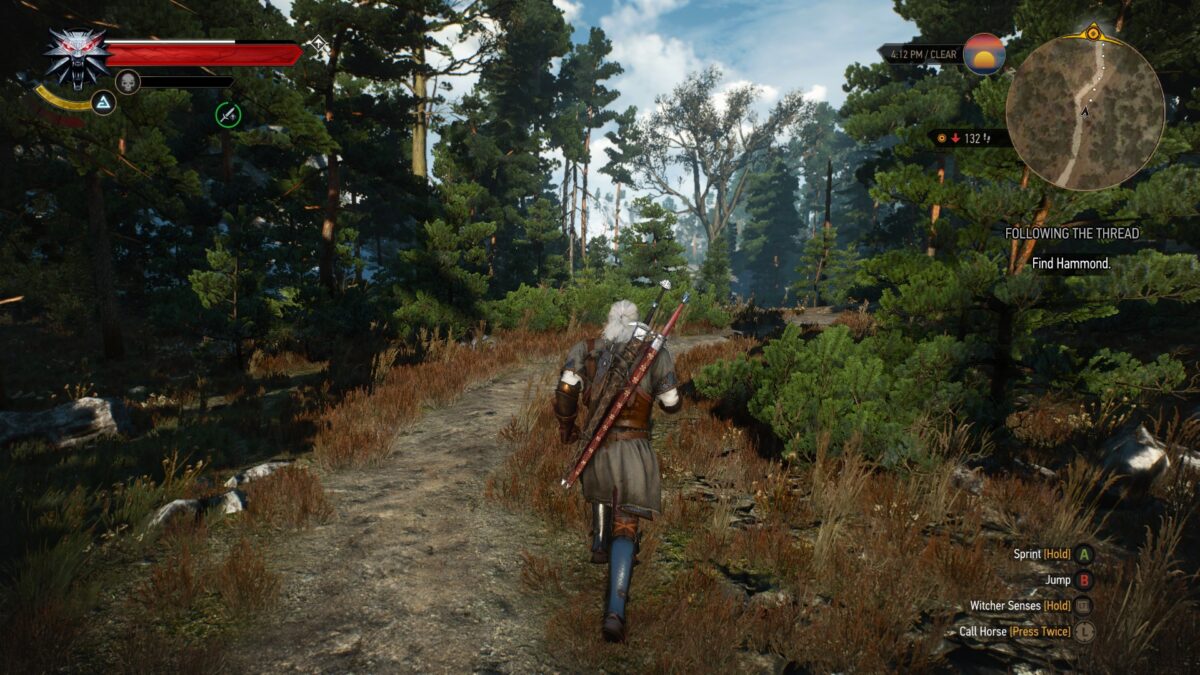Looking for the Quick Review?
I can’t believe I’d never played The Witcher 3. In retrospect, I feel like a big dumb idiot. I think we’ve all known the experience of having been repeatedly recommended the same critically-renowned game and foolishly ignoring our friends and the virtues they extol. That’s a mistake I definitely made with The Witcher 3, the game that erased the month of July from my calendar.
The Witcher 3 is a role-playing game semi-unique among modern RPGs in that the role you play is pretty set in stone: you’re Geralt of Rivia, a Witcher, which is a sort of fantasy mutant wizard detective charged with the slaying of the grotesque monsters that plague the world. Your story is Geralt’s story; there are skills to acquire and choices to make, but there’s none of the traditional character customization you might see in a typical Bethesda RPG like Fallout or Skyrim.
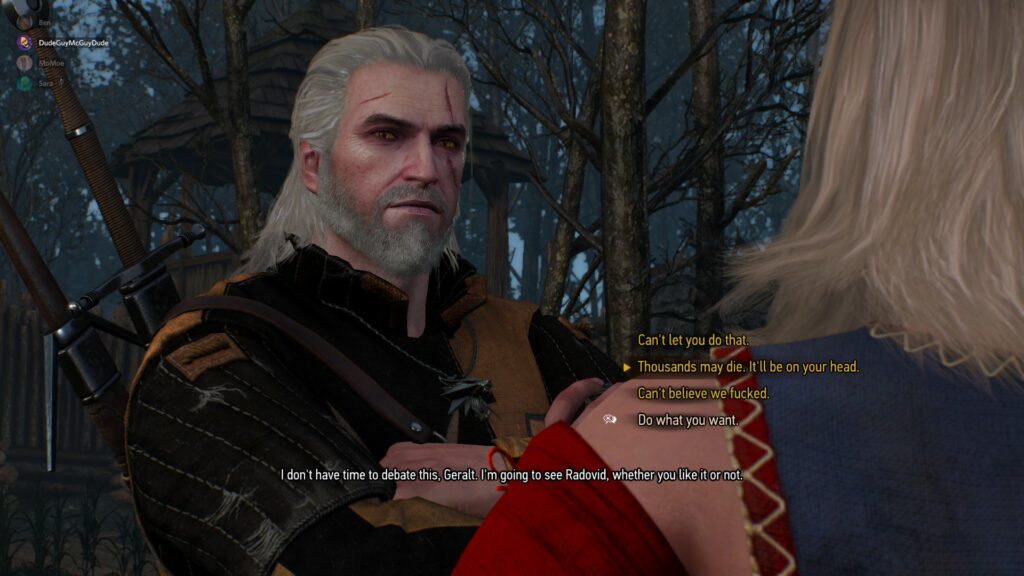
Make no mistake; I understand that this type of blank slate character customization is a relatively new norm. Exempting stuff like Dungeons and Dragons, playing a premade character was the default experience for a while. But I think it’s worth explaining at length here for two reasons: first, because it’s sorta unique for a game of this scope that came out in 2015, but second because I think it’s one of the foundational building blocks of the game’s stunning success.
Playing as Geralt takes away a lot of the necessary immersion-building required in a blank slate RPG. Pretty early on, we know who Geralt is, his brief history, what he stands for, and what he wants. Specifically, he’s a monster hunter in search of his lover, Yennefer, and his adoptive daughter/witcher padawan, Ciri. From then on, the world comes together around him, and we learn everything we need to know about it by allowing its knowledge to pass, first through Geralt, and then on to us.
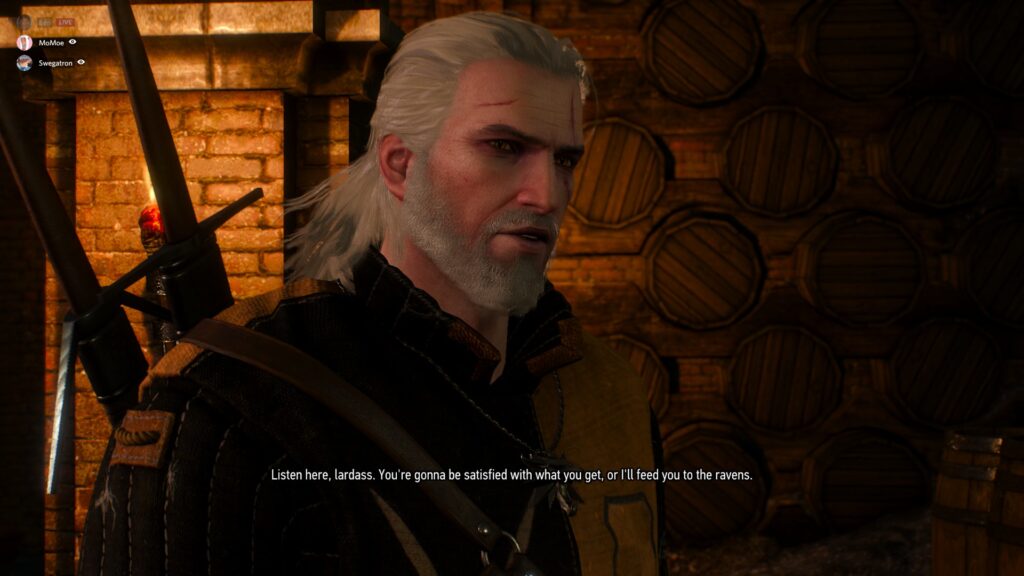
I should probably note that I’ve never played The Witcher or The Witcher 2. Unlike the third installation, those didn’t come with the same hearty recommendation that eventually pushed me to give number three a shot. If you’ve played those, all this nonsense about world-building might be irrelevant to you, or it might not. Again, I haven’t played them; it’s all a mystery to me. For those of you, though, who also haven’t had the chance of enjoying the first two games, especially those hesitant to try the third without having done so, you’re in good company. My experience jumping directly into the third act was super uncomplicated. The world and story of The Witcher are huge, but its scope is such that the game takes a “there are just things you’re not gonna know” approach in exploring them. Geralt is constantly meeting old friends throughout his journey, but as far as I can tell, many of these old pals weren’t in the previous games. Some of this can undoubtedly be traced to the game’s origin as a series of novels, but what’s important is recognizing that I never felt like I was missing information; we may not learn everything about Geralt’s past with his friends and companions, but the game does explain everything we do need to know to understand the story of The Witcher 3.
Speaking of story, it’s hard to not call it what it is: one of the best video game stories I’ve ever explored. The narrative isn’t particularly epic, and the ending (no spoilers here) left me feeling, not necessarily disappointed, but… content, but the absolute scale of it is truly impressive. No fewer than three times throughout the main quest did I feel like I was just about done with the game, only to learn I still had hours to go. There’s one quest that, in my opinion, is set up exactly like a final confrontation with the big bad guy, complete with a drawing-together of the story’s loose ends, but nope — there were still hours ahead of me. Ultimately, what I really enjoyed as a supreme story nerd was the time spent telegraphing and foreshadowing of future events and the revisiting of previously-visited locales to display the effects of your choices on those you’d previously interacted with. Because the game pulls Geralt’s associates from stage left without explanation, I expected more than once for them to disappear with as little warning, but they don’t; each plot thread carries its own all the way to the end. Even if it’s not the absolute best story, it’s hard to believe it’s not the best possible telling of that story.
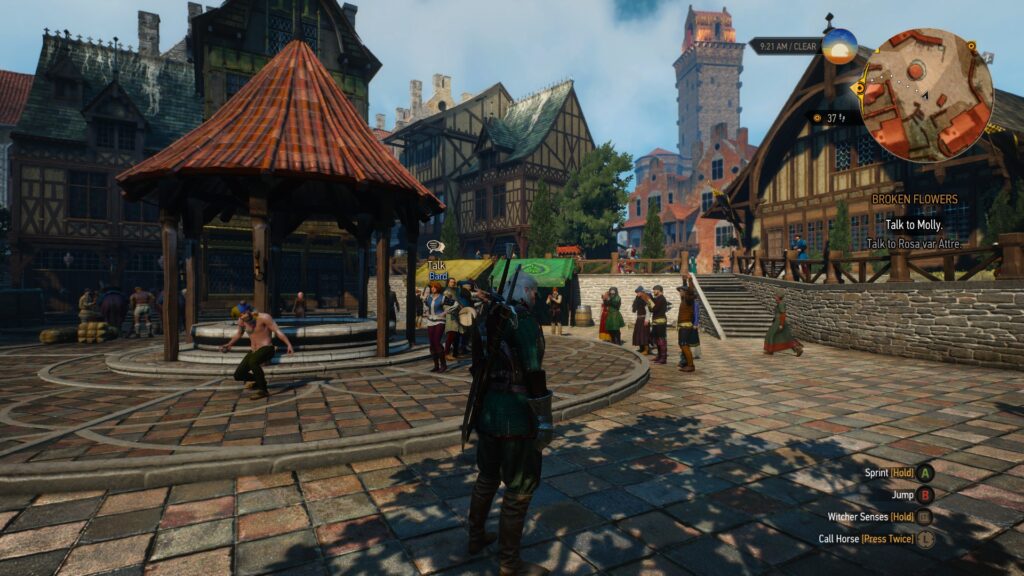
The absolute breadth and scale of The Witcher is insane and totally incomparable to anything I’ve played so far. I found myself in regular awe at the size of the world and the variety of tasks to complete inside it. The world’s four playable regions are each clearly limited, and their geographical isolation from one another makes each inherently smaller, but wandering through the swamps of Velen, the streets of Novigrad, and the mountainous isles of Skellige, I never felt constrained by those borders. Each region feels alive and teeming with content, new quests and opportunities popping up organically as you journey from town to town.
I even found a way to be impressed with the game’s handling of side quests. In some RPGs, especially those where the story involves high stakes, taking a hiatus from your mission to save the world in order to deliver meat for the local butcher seems… irresponsible. To be fair, in The Witcher 3, it’s not an entirely different story — you’re on a mission to save your daughter from uncertain peril, and any diversion from that goal requires a tiny bit of suspension of disbelief. Still, I was impressed with the way these quests fit into the story; some of them have you helping out friends and companions, but many of them appear in the form of witcher contracts. In towns all around the world, villagers post open contracts for brave wanderers to solve their monster problems. Being that you are a monster hunter by trade, if there is a time you’d divert yourself from your main goal, it does follow that it would be to do your job.
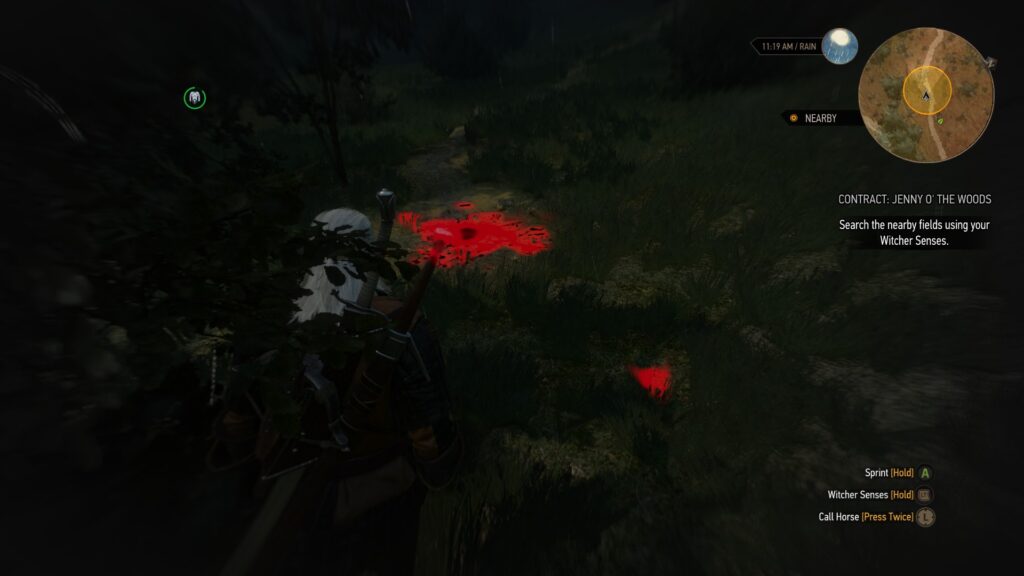
And fighting monsters in The Witcher 3 is fun. The combat has something of a mixed reception online, but I found it engaging enough. It’s a few steps further in complexity when compared to something like Skyrim, which I know isn’t saying much, but it’s definitely something. Effective combat requires variation, especially against tougher monsters, and, depending on the difficulty you’re playing on, understanding the effectiveness of dodging and item use is the difference between success and instant death.
Variation in combat comes from altering between attacking, dodging, and use witcher signs, a set of five magic spells that can be cast to summon fire, push enemies back, influence an enemy’s (or an ally’s) mind, trap an opponent in a magical field, or encase yourself in an energy shield. Depending on your personal build, signs can contribute significantly to a fight, and choosing which to use against what monster, or which to spend upgrade points on, can change the game. There’s also alchemy, the brewing of potions that temporarily beef Geralt up in a number of ways and oils that increase your damage versus a particular type of monster/enemy. Alchemy skills can be upgraded in the player menu just as combat and signs, and, if the internet is to be believed, an alchemy-focused build can be an A+ way to tear through the game with minimal difficulty.
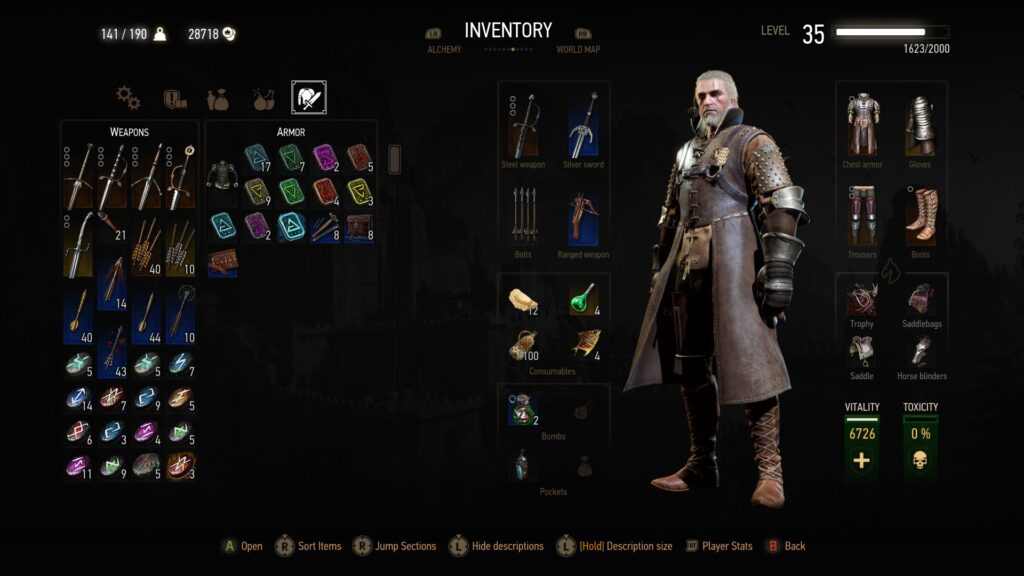
Among The Witcher’s remaining features is Gwent, its playing card-based game-within-a-game. I’ve never been a huge fan of card games, online or off, so my experiences with Gwent were limited. From those unlike myself, I’ve heard it’s pretty good. If you’re not sold on the idea of a critically-acclaimed 100-hour RPG but considering buying this one for its card game, hang on: Gwent is also available in standalone form on Steam for free. In other words, you can try Gwent for free and then decide whether or not you had enough fun to try The Witcher.
It’s hard to nail down what I liked so much about the Witcher because its greatest asset may be the synergy between all of its components — the machine is greater than the sum of its parts. The game’s story fits perfectly into its expertly-crafted world, both providing an immersive backdrop for what is, regardless, an extremely fun game. The Witcher 3 is a game that doesn’t cut corners; “filler” content is absolutely minimal if not absent entirely. This is one of the longest RPGs I’ve ever played, and I thoroughly enjoyed each moment.
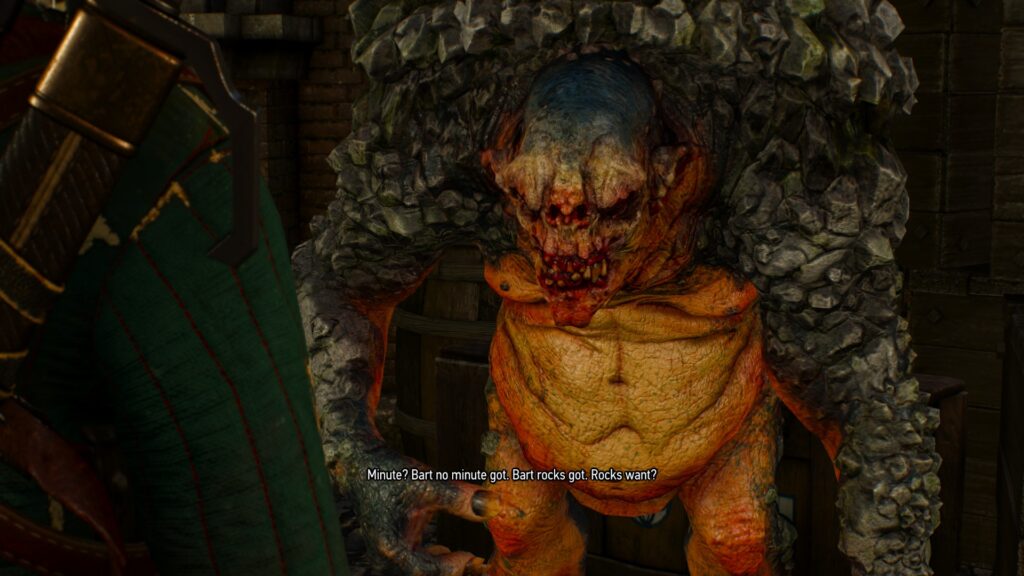
If I were to indulge the need to nitpick, there are elements of the game’s story I found dissatisfying. No direct spoilers, but if you’re not interested in having the story structure hinted at, go ahead and skip this paragraph. I wrote earlier in this review that I wasn’t disappointed with The Witcher 3’s ending. Admittedly, that’s not entirely true. I can honestly say that the end of the game isn’t definitively disappointing, with the necessary catch being that, out of its three primary endings, one of them undoubtedly… is. And it’s the one I got. Out of all that there is to do in the game, the quests to complete, decisions to make, etc., the game’s overall ending hinges on remarkably little of that. It’s your relationships with just three characters that determine the direction of Geralt’s story. For a game focused heavily on relationships, the importance of developing ties with the protagonist’s closest companions would require no explanation. For The Witcher 3, a game which rarely offers more than two or three speech options in any given conversation, it doesn’t really make sense. The decisions that do impact the game’s end are laughably minor in the context of the game’s broader story, and I honestly believe the direction they pulled me in was neither intuitive nor properly telegraphed. I still love the game, but I can’t say the ending didn’t stain the experience for me.
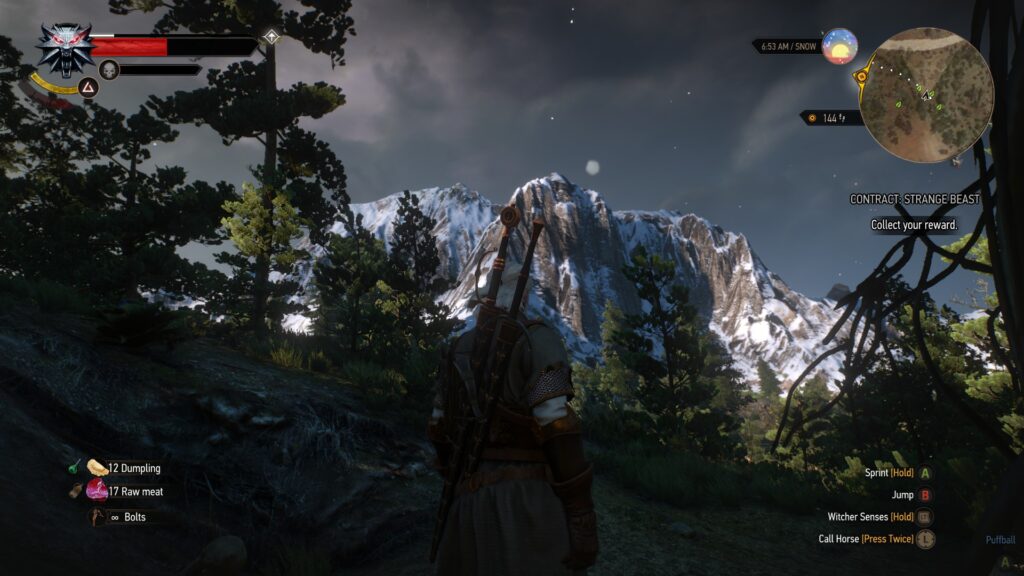
Minor problems aside, The Witcher 3 is the best RPG I’ve played in a while. There’s a good chance it’s the best one I’ve ever played. Even if it weren’t, I pulled somewhere around a hundred hours of entertainment out of a game that I purchased on sale for less than $60. At full price, this game is easy to recommend. Anything lower, it’s hard not to require.
Quick Review
Game: The Witcher 3
Made by: CD Projekt Red
Published by: CD Projekt Red
Available for: Nintendo Switch, PlayStation 4, Windows PC, Xbox One
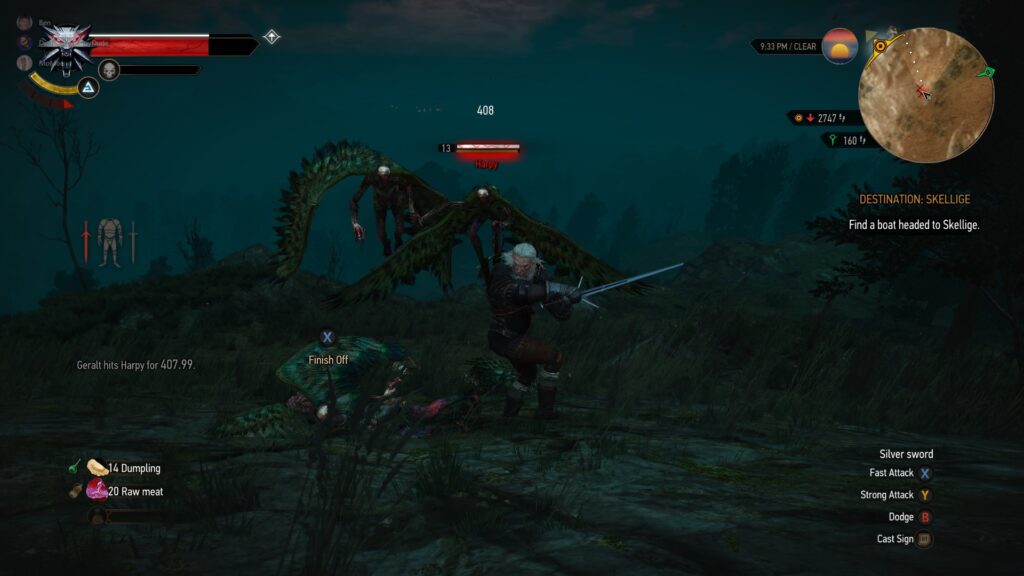
CONTENT
Microtransactions: None
Tedium: Little
Violence: Graphic
Content: Blood and Gore, Mutilation, Brief Descriptions of Sexual Violence, Sexual Depictions of Partial Nudity, Swearing
FEATURES
- 100+ Hours of Gameplay
- Narrative focus
- Character progression
- Boss battles
- Open world
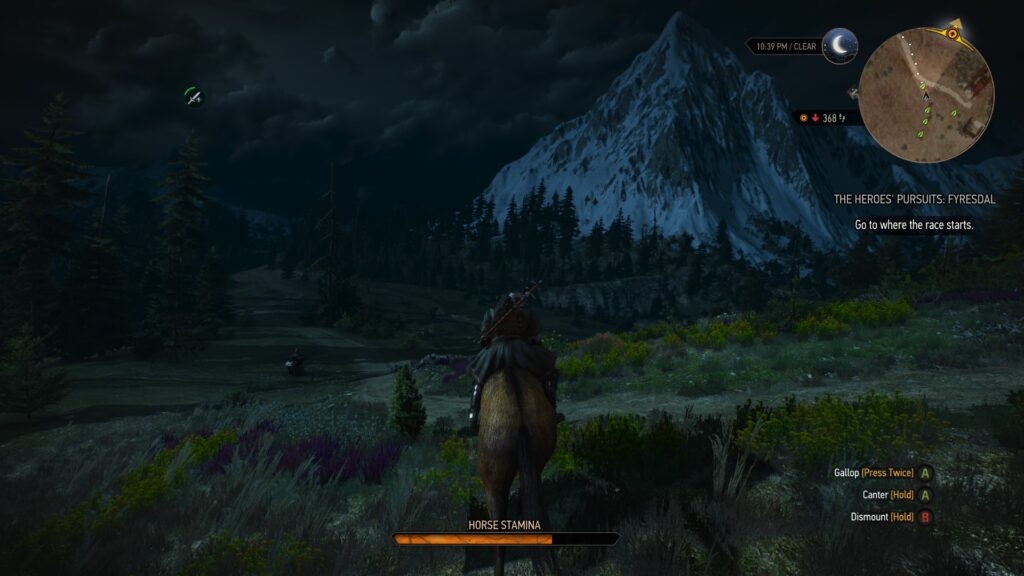
WHAT I LIKED
- Huge, well-developed world
- Fantastic world-building
- Gripping story
- Engaging combat
CONCERNS
- Limited player choice
- Some temporary destabilization caused by bugs (Helpful NPCs don’t appear or react)
WHO’S IT FOR?
If you’re a fan of deep, character-driven RPGs with massive worlds, it’s hard, if not impossible, to recommend a better game. If you’re looking for a short experience, a game with in-depth character customization, or anything multiplayer, The Witcher 3 might not be it.
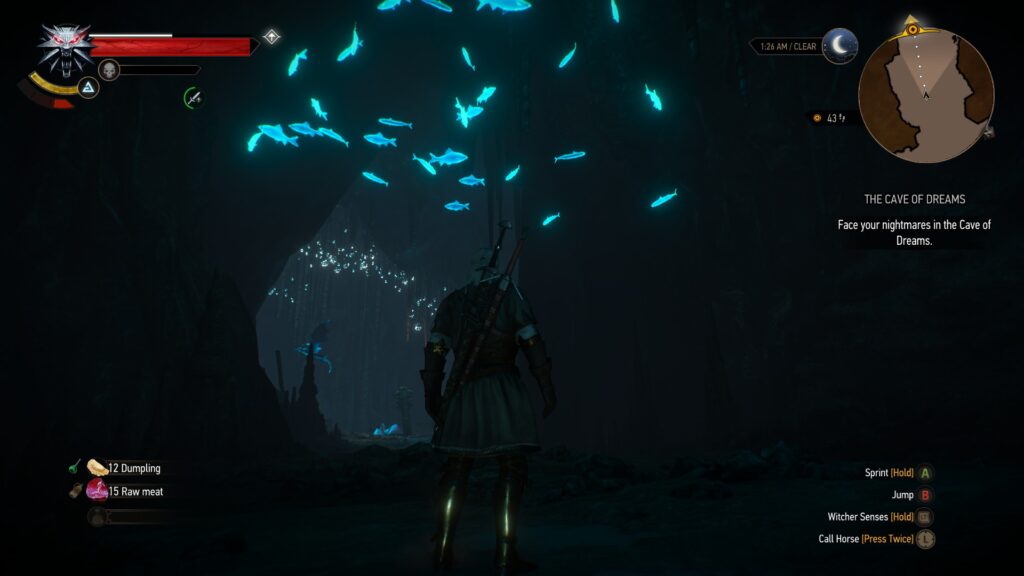
STATISTICS
From Steamspy unless otherwise noted.
Average Playtime*: 62 hours
Average Cost per Hour**: $0.65
Median Playtime*: 21 hours
Median Cost per Hour**: $1.90
* Playtime rounded to the nearest quarter-hour
**Costs calculated using a price of $39.99
